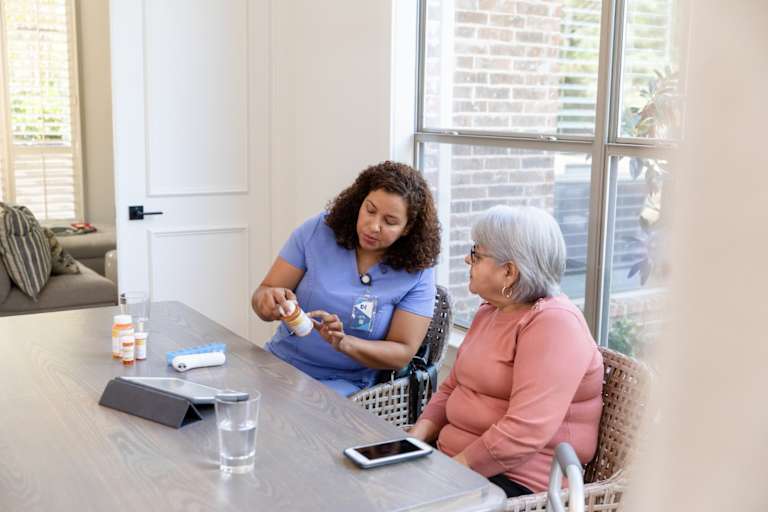Nurse Researcher Career Overview
What Does a Nurse Researcher Do?
Nurse researcher jobs involve designing and carrying out research studies, either through new data that they create or from existing research. The following is a list of nurse researcher responsibilities:
Primary Responsibilities
- Designing nursing research studies
- Carrying out research
- Documenting that their research protects any human or animal subjects involved
- Publishing findings in peer-reviewed journals or books
- Presenting at conferences
- Keeping up with professional literature
Career Traits
- Strengths in analysis, observation, and written communication
- Ethical in publishing studies and the treatment of human or animal subjects
Where Do Nurse Researchers Work?
Nurse researchers work in academic medical centers, government agencies, and other healthcare providers.
Academic Medical Centers
Nurse researchers in academic medical centers conduct research, publish results, and teach undergraduate or graduate students.
Government Agencies
In government agencies, these professionals perform research, share findings, and publish results internally or externally.
Publishers
Nurse researchers working in publishing select articles for publication, review methodology and validity, and edit articles in collaboration with authors.
Why Should I Become a Nurse Researcher?
Research nurse jobs add to professional knowledge and help nurses to do their jobs with evidence-based research, improving healthcare outcomes. Nursing research doesn’t include the same physical demands as clinical nursing and offers more predictable schedules. However, nurse research jobs typically do not pay as much as clinical nursing roles.
Advantages To Becoming a Nurse Researcher
Contribute to professional knowledge
Important findings can change how nurses work and improve healthcare
Less physically demanding and more predictable schedules than clinical care
Disadvantages To Becoming a Nurse Researcher
“Publish-or-perish” culture in academia
Some may find work less fulfilling by not directly interacting with patients
Requires time and financial investment in a master’s or doctorate
Salaries are typically lower than clinical nurse practitioner salaries
How To Become a Nurse Researcher
Becoming a nurse researcher requires developing skills in research methodology, informatics, statistics, and nursing itself.
- 1
Graduate with a bachelor of science in nursing (BSN) or an associate degree in nursing (ADN)
A nurse can begin practice with just an ADN, but master’s-level nursing programs require a BSN, so an aspiring nurse researcher must plan to acquire a BSN either directly or as part of a master of science in nursing (MSN) bridge program.
- 2
Pass the NCLEX-RN exam to receive registered nurse (RN) licensure
The National Council Licensure Examination for RNs is a national exam that includes questions on conditions and treatment, nursing practice, patients’ psychological needs, and ethics/legal issues.
- 3
Begin research
After acquiring RN licensure, nurses can begin to participate in research, often by assisting nurse researchers or other research professionals.
- 4
Apply to an accredited MSN, doctor of nursing practice (DNP), or doctor of philosophy in nursing (Ph.D.) program
Most MSN and doctoral degrees require at least two years of experience as an RN. Some programs have bridge programs for RNs without BSNs.
- 5
Earn an MSN, DNP, or Ph.D.
Some employers, especially academic medical centers, require or strongly prefer a Ph.D. or DNP, while others require only an MSN.
- 6
Apply for certification
Certification is not mandatory but provides a valuable credential. Most certifications require active research experience. Options include clinical research associate, clinical research coordinator, certified professional (through The Association of Clinical Research Professionals), certified research nurse, and certified clinical research professional.
How Much Do Nurse Researchers Make?
The annual median research nurse salary is $81,500. Generally, nurse researchers with doctoral degrees earn more than those with master’s-level education. Some research nurse professionals in academia qualify for tenure. In general, clinical research associates earn a median salary of $78,344, while certified clinical research professionals earn an average salary of $83,000. However, because of the RN credential, nurse researchers with these certifications generally earn above the average or median for those positions.
Resources for Nurse Researchers
International Association of Clinical Research Nurses
IACRN improves nursing research, supports nurse researchers, and offers professional development. It also grants board certification to clinical research nurses by portfolio. Research nurses can be full members and RNs or equivalent who are not active researchers can become associate members.National Institute of Nursing Research
This U.S. government agency, as part of the National Institutes of Health, conducts and supports research, offers training in research methodologies, and provides significant funding for nursing research.The Association of Clinical Research Professionals
ACRP is one of the most prominent certifying organizations for clinical researchers. It also offers educational resources, networking opportunities, and a job board. It has approximately 13,000 nurse researchers and other clinical researcher members around the globe.Society of Clinical Research Associates
SOCRA provides educational and professional development opportunities, publishes a journal, offers certification for clinical research professionals, features a job board with nursing research job listings, and hosts networking events. Membership is open to all clinical researchers.
Frequently Asked Questions About Nurse Researchers
Nurse researcher careers require a significant time investment. It takes at least six years of education to earn an MSN and seven years for a doctorate. In addition, most MSN and doctoral programs require at least two years of experience as an RN.
Reviewed by:

Nicole Galan is a registered nurse who earned a master’s degree in nursing education from Capella University and currently works as a full-time freelance writer. Throughout her nursing career, Galan worked in a general medical/surgical care unit and then in infertility care. She has also worked for over 13 years as a freelance writer specializing in consumer health sites and educational materials for nursing students.
Galan is a paid member of our Healthcare Review Partner Network. Learn more about our review partners.



